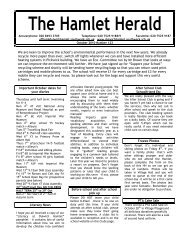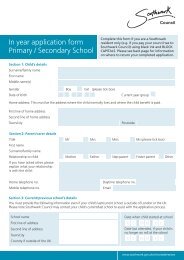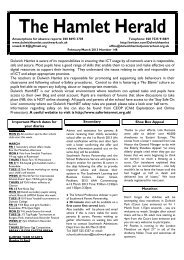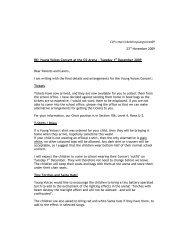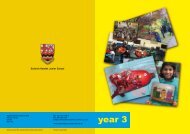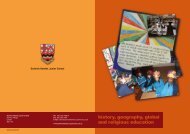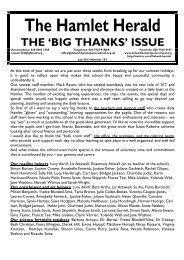Dulwich Hamlet Junior School Prospectus
Dulwich Hamlet Junior School Prospectus
Dulwich Hamlet Junior School Prospectus
- No tags were found...
You also want an ePaper? Increase the reach of your titles
YUMPU automatically turns print PDFs into web optimized ePapers that Google loves.
Why choose<strong>Dulwich</strong> <strong>Hamlet</strong>?...because it listensto its pupilsHistorically the school is over-subscribed due to its academicrecord and well-deserved reputation in the local and widercommunity. The school is vibrant, exciting and listens to itspupils - only by listening can we begin to find the uniqueabilities that will help each child to flourish in the future. A raftof encouragement from and within the teaching and supportstaff, instills confidence in pupils and teachers alike. This is why<strong>Dulwich</strong> <strong>Hamlet</strong> has been recognised as an ‘Investor in People’and given the special status by the Department of Educationand Skills of ‘Training <strong>School</strong>’, one of only a handful of schoolsin London to receive such distinction.We know that we have to keep listening to our pupils if weare to sustain and improve on our own high standards to helpeach child achieve their own greatness.
Coresubjects‘Reading skills are very high. Pupils read with confidence and fullunderstanding, being very fluent. Standards in writing are verygood overall and on occasion, are exceptional. Vocabulary anduse of grammar is very good.’ – OFSTED‘Many pupils are working at high levels in most attainmenttargets... the work is challenging but they work hard and enjoysupporting each other and finding solutions.’ – OFSTED‘In science, by the time they leave the school, pupils have a verysecure knowledge of the science curriculum.’ – OFSTED‘Pupils’ personal development is promoted very effectively throughthe school’s provision for their spiritual, moral, social and culturaldevelopment. The curriculum promotes pupils’ spiritual developmentvery well. Assemblies offer effective moments for quiet reflection.’– OFSTEDEnglishAll children take part in the daily Literacy Hour, which allowsfor a variety of tasks at word, sentence and text levels. Childrenenjoy speaking and listening, reading and writing and presenttheir work in various ways. Everyone is taught spelling andjoined-up handwriting. Pupils encounter a range of resourcesand a variety of tasks in the development of their reading,writing, listening and speaking skills. There is literacy supportfor small groups of pupils who may need extra help.Children are encouraged to talk and listen to each other’sopinions and suggestions, in activities across the curriculum.Class assemblies give practice in speaking to an audience.Books and reading are an important part of the school culture.Each classroom has a good supply of fiction and referencebooks that are changed regularly, and children borrow books totake home from their classroom library or the new library in thePickwick Building.MathematicsAll children take part in the daily Numeracy Hour, whichfollows the National Numeracy Strategy’s scheme of work, withits early emphasis on mental arithmetic.Children are grouped according to ability in classes, and acrossthe year group for some sessions in years 5 and 6.Links are made with the topics children are already studyingin class so that they can see mathematics in a wider setting.Investigative tasks are encouraged in order to help the childrendevelop their skills and understanding.We have many mathematical resources, including computersoftware. Each class has its own set of mathematical equipmentand access to an interactive white board.Different schemes are used to enhance and broaden thechildren’s experiences and we use Key Stage 3 text booksin some year 6 classes.ScienceDuring the school year children study three topics, at leasttwo of which have a large scientific element. Children aretaught about the world around them through their owninvestigations and observations. They are encouraged to makesense of their work by raising questions, putting forward ideas,or suggesting explanations. The children will also learn topredict outcomes and form hypotheses of their own. Throughclass visits, and listening to outside speakers, children havethe opportunity to extend the knowledge they have gained.Information and communication technology (ICT)We are very proud of our new ICT suite in the new PickwickBuilding. ICT enables everyone to learn better by undertakingthe research, process, analysis and presentation of information;ICT opens a window on vast depths of information and routes ofcommunication with others. All children have supervised accessto this, in addition to the computers in their own classrooms andthe interactive white boards. <strong>Dulwich</strong> <strong>Hamlet</strong> is on-line, and canbe found at: www.dulwichhamlet.southwark.sch.uk/Religious educationOur lessons tell children about Christianity and other faithsfollowed by communities in Southwark. They help the childrento understand and respect each other’s faiths. Daily assembliesallow us to celebrate together all that is finest in humanexperience, and learn about each other and the world we livein. We are concerned that the children begin to find meaning,purpose and value in life. Because we are a communityschool the collective worship of our assemblies must be nondenominational,but, by law, wholly or mainly of a broadlyChristian character.Parents are encouraged to join their children for their classassemblies, which are prepared by the children and reflect selfworthbased around a current area of study.
FoundationsubjectsMUSICMusic is the backbone of creative expression at <strong>Dulwich</strong><strong>Hamlet</strong>. All children are encouraged to become enthusiasticmusic-makers whether by using their voice, an African drum,a clarinet, a trumpet, a triangle…. Each child is taught tocompose, perform, listen to, appraise and appreciate music.We are very proud of our music tradition. Over half of ourpupils are learning a musical instrument in school, with a largenumber of children passing exams, many with high grades.We provide opportunities for children to learn a string, brassor woodwind instrument, which are lent free of charge. Thereis a termly fee for the lessons, which is extremely good valuecompared to private tuition, and help is available for familieswith lower incomes.All children learning an instrument, inside or outside of school,are encouraged to join the school’s String Orchestra, the BrassEnsemble, the Recorder Ensemble or Consort, WoodwindEnsemble and the flute and clarinet choirs.There are three major performances in the school year –the Christmas Carol Concert, held at St Barnabas, a summerconcert and a year 6 musical dramatic production. Thesimple description of these events does nothing to relay theirmagic – the quality of music, both instrumental and vocal, isoutstanding year on year. Their music inspires the whole school– it is not a statistical blip that so many of our children arelearning an instrument!Our new music room contains a wide range of pitched andunpitched percussion for class lessons from different cultures,as well as a huge range of orchestral instruments such as flutes,cellos and French horns. We also have a keyboard laboratoryand a set of steel pans. There is a weekly lower and upperschool music lesson with our music co-ordinator and classlessons on a modular basis.We make many opportunities for the children to hear and workwith accomplished live musicians both in and out of school.All our musicians are given opportunities to play to the schoolcommunity in assemblies, concerts and productions throughoutthe year.‘In a singing lesson for the whole school, the teacher, amusic specialist, demonstrates excellent managementskills. Planning is of a very high order and the pace oflessons is such that this exciting teaching enraptures thewhole school. The pupils sing songs they already knowvery well and learn a new song very quickly, not becauseit is easy (it is actually quite difficult) but because theirconcentration levels in this lesson never waver in responseto the excellent teaching.’ - OFSTED10 11
ARTThe children are taught an exciting rangeof skills and techniques, using a variety oftraditional media and new technology, andthey study different artistic styles from variouscultures. Our relationship with the <strong>Dulwich</strong>Picture Gallery is integral to our approach toteaching art.We have an annual Art Exhibition, to which parents are invitedto view the best of the artwork from that year.The school has also been awarded the prestigious GoldArtsmark, in recognition of its commitment to developingand promoting art, visually, dramatically and musically. Art isincorporated into all areas of the curriculum.Through focused practical tasks, using a wide rangeof materials, structures, mechanisms and computers, childrendevelop different skills, from evaluating commercial productsto designing and making their own creations.Children have the opportunity to try a wide variety of activities,from making moving monsters to making movies using ourexpanding suite of audio-visual and multi-media equipment.1213
Over their four years at <strong>Dulwich</strong> <strong>Hamlet</strong>, children use gamesand gymnastic apparatus and learn a range of different dancestyles. They are taught skills and techniques, which they thenapply in all types of team and individual games, coveringinvasion, strike/field and net/wall. We regularly have qualifiedcoaches who visit the school and lead lessons. Year 4 and 5 haveswimming lessons, and school clubs usually include cricket,athletics, gymnastics and football; the school is represented inlocal athletic, swimming, gymnastic and cricket league games.Parents are warmly invited to Sports Day every year.PHYSICAL EDUCATIONPERSONAL, HEALTH, SOCIAL& SEX EDUCATIONThere is a whole school approach to this area, tailored tothe age and maturity of the children in each year group. Itis designed to give the knowledge, skills and understandingneeded for the children to value and respect each other, andlead healthy and increasingly independent lives.Moral values, emotional and physical development andrelationships are considered in the safe context of ‘circle time’,in class discussions and activities across the curriculum. Herechildren can reflect on the shared and personal experiencesof growing up and learn about making informed choices.Citizenship offers insight into the main political and socialinstitutions and how these affect our lives, it explores the vitalroles that individuals play in society: their rights, responsibilitiesand duties, as members of different groups and communities.All children take part in a basic drugs education course.Puberty, Sex and Relationship Education is studied more fullyin Year 6, with factual information and guidance. This helpsand supports children in their final year and enables them tomove with confidence and with a high level of self-respect fromjunior to secondary education. Parents are fully informed of thecontent of the sex education programme and may request thattheir child be withdrawn from specific lessons.HISTORYChildren usually study two different periods of historyevery year – from Ancient Greece to Britain since 1930 – andare taught how to interpret historical evidence, often usingreproduction and real artifacts. To reinforce their study, theatregroups and visitors bring the subject alive and children visitplaces of historical interest.GEOGRAPHYOur geographical studies are both wide-ranging anddetailed. Children study physical geography as well as gainingan appreciation of the world’s ethnic, cultural and economicdiversity. By studying different locations, the children developa sense of identity. This also helps them understand theinteraction between people, places and environments and theprocesses affecting them. We place a lot of emphasis on firsthandpractical experience of geography, fostering a sense ofconcern for the future of the earth and its peoples.14 15
Why choose<strong>Dulwich</strong> <strong>Hamlet</strong>?…because it adds value...by bringing the curriculum to lifeThe National Curriculum underpins the children’s learning, but it is brought to life through the creative arts and with visits,trips and opportunities to explore, discover, dress-up and perform. The teachers work hard to keep the children tuned into learning, to fire their imagination and create an environment that is varied, inspiring and fun.The ‘Enrichment Programme’ inspires creativity and opens a window on the full glorious picture of the individual child.…with visitors• A zoologist thrills the children with weird andwonderful creatures.• Victorian school teachers (ours) transform theschool back to its early days to give the children(appropriately attired) the experience of life as aVictorian pupil.• Marcus the Roman inspires the children to dress-upand discover all things Roman.• Poets and writers in Book Week when the school isteeming with children imaginatively dressed as theirfavourite fictional characters.• A theatre company brings Greek myths and legendsdramatically to life.• Mexiclore enthral the children with their Aztec resources.• The sensational Globe Theatre players regularlyperform to, and with, the children.• A visiting specialist teaches dance.• <strong>Dulwich</strong> Picture Gallery staff work with the children inschool and at the Gallery.• Parents willing to share their area of expertise withthe children.…visits• National galleries, museums, gardens, places of worship.• Year 5 children experience a residential trip toArethusa Venture Centre on the River Medway to tryvarious outdoor pursuits and environmental studies.• Year 6 visit Northern France for an overnight stay toexperience foreign travel and try out newly acquiredFrench language skills.…performances• A Christmas carol concert in St Barnabas rounds offthe first term with the whole school singing, playingan instrument or acting. The result is an oftenmoving and thought provoking performance as thechildren are encouraged to share their own thoughtsand perceptions of the Christmas message of peaceand goodwill.• Year 6 say farewell with an enthralling flourish of highdrama, music, dance and creative flair that is the end ofterm production.• A summer concert, held outside, is a magical eveningwhen the children show-case their musical talentsand fill the <strong>Dulwich</strong> air with haunting, sometimeshearty, but always inspiring music.…clubsAn ‘Enrichment Programme’ in the summer term allows thewhole school to close their books on a Friday afternoon and pickup knitting needles, or tools to rebuild a car engine, to throwclay pots, sculpt mod rock, dance, write plays, animate films, playfootball, work on the cycling proficiency test or anything from awhole list of activities to inspire creativity and open a window onthe full glorious picture of the individual child.There are many other opportunities to take part in differentclubs, some held at lunchtime, and some held after school.…and the school environmentThe new Pickwick building, Purcell Music Rooms and newplayground equipment are wonderful additions that completethe school. The Pickwick building houses a bright open spacefor a new library, a state of the art computer suite, additionalteaching space and a staff room. The Purcell Music Roomsprovide much needed space for our ever-growing numbers ofmusicians. The new playground equipment, provided by theefforts of our committed PTA, gives the children the balancethey need in their hard-working day. Our school garden andbicycle racks are features of our healthy school environment.The quality of music, creativity and performance istruly inspirational.16 17
The practicalities...and because it values the school communityParentsWe would not be the school we are today if we did not workin partnership with the parents and carers of our pupils. We areso grateful for the efforts and enthusiasm of the parents wholisten, encourage and support their children’s endeavours intheir journey through <strong>Dulwich</strong> <strong>Hamlet</strong>.The school aims to communicate clearly, promptly andeffectively with parents about all aspects of school life on aformal and informal basis. The <strong>Hamlet</strong> Herald (distributed eachhalf-term) is the Headteacher’s newsletter to parents. It givesinformation about staffing, various school events, advancenotice of assemblies, information about clubs, sports activities,school life, trips and special visitors, and dates for the diary. Ona daily level, parents and carers are kept informed about schoolactivities through individual letters in the children’s book-bags.A contact book, kept in the book bag, is used by parents andteachers to record reading progress.Open evenings give an opportunity to discuss children’sprogress, look at their work and record parents expectations.Parents are always welcome to discuss their child’s work inmore detail by appointment with the class teacher. If a problemcannot be resolved in a chat with the class teacher, parentsare invited to discuss the matter with the Headteacher, or theSpecial Needs Co-ordinator.An annual written report is sent home in the summer term.The Parent Teacher AssociationWe are very lucky to have an active and tremendouslysupportive PTA. A successful fundraising campaign resultedin the wonderful addition of play equipment to a once drearyplayground. Every year the PTA organise a number of socialevents for the whole school community, to help to raise extrafunds for the school. Summer doesn’t really begin until theannual May Fair is underway – with maypole, stalls, games,tombolas and a barbecue. The PTA supplies water and ice-lolliesto the children on Sports Day and, perhaps more importantly,wine (and other non-alcoholic beverages) to new parents at theWelcome Evening, Summer Art Exhibition and AGM! They alsodo a fantastic job of organising and selling new and secondhandschool uniforms.<strong>School</strong> GovernorsIn all schools, governors work to promote high standardsand educational achievement. They are responsible for makingstrategic decisions, such as setting and monitoring the schoolbudget, ensuring the curriculum is broad and balanced, dealingwith the upkeep of the buildings, writing school policies andgenerally being a collective body to direct and support therunning of the school. The Headteacher has the onerous task ofmanaging the school on a day-to-day (hour-by-hour and evenminute-by-minute) basis.The role, membership, and committee responsibilities of theGoverning Body can be found in the Governors’ Annual Reportwhich can be obtained from the school office.<strong>School</strong> rulesOur five school rules are colour-coded to help childrenremember them. They can be summed up as:• Be kind• Be safe• Be responsibleWe use many positive methods of promoting good behavioursuch as ‘Thank You’ certificates and ‘Achievement’ awards.Attendance and punctualityAt <strong>Dulwich</strong> <strong>Hamlet</strong> <strong>Junior</strong> <strong>School</strong>, we are proud of ourattendance record, which is well above the national average.Our pupils, and parents, understand that if a child is to benefitfully from all the school has to offer, it is imperative that schoolis attended regularly and on time. Obviously when a child isunwell, home is the place to be; an ailing child at school will notbenefit him or herself, or indeed other children.We monitor attendance and insist on clear and specific reasonsfor absence. In the event of absences and/or lateness becomingpersistent, the school contacts parents directly and may workwith Educational Welfare Officers to resolve the problem.Absence affects children’s work, so requests for leave mustbe made to the Headteacher (leave for Year 6 children duringKey Stage 2 tests in May, or for children with a poor attendancerecord is not given). Leave taken without permission is recordedas unauthorised.<strong>School</strong> uniformWe believe our uniform gives a sense of belonging andcommunity identity. It also suggests equality and avoids pre-teenfashion angst. Children at the <strong>Hamlet</strong> wear a uniform of the schoolsweatshirt, together with the school polo shirt or T-shirt, in eitherjade or navy blue. Navy blue trousers, skirts or shorts are also worn.Shoes must be appropriate, black or dark blue (no trainers or opentoesandals). For PE, a white school T-shirt and blue shorts for thesummer, or long sweat-pants for the winter are worn, togetherwith plimpsolls or trainers. Jewellery is not allowed.<strong>School</strong> lunchesContract caterers, who prepare fresh food on site in ourkitchens, provide school lunches. They offer a choice of maincourse, including a vegetarian dish. Salads, puddings and freshfruit are served every day, and water is provided with meals.Provision can be made for children with allergies or religiousconsiderations. <strong>School</strong> packed lunches are also available andinclude a sandwich, packet of crisps or biscuit type snack anda piece of fruit. Children may also bring in their own packedlunch. All packed lunches may be eaten at picnic tables in theplayground or in the dining hall.18 19
HomeworkChildren will be expected to complete some work at home.This reinforces and extends what the children are learning in theclassroom and may include preparing a verbal presentation, orproject work related to classwork.Regular reading is assigned and children learn spellings andtables for weekly tests. Children in Year 6 may have work that willfocus on their tests and secondary transfer. Children with SpecialEducational Needs may have homework linked to their IndividualEducational Plan targets. We aim for a consistent approach witha similar homework programme across each year group. Atthe beginning of term, the year group teachers give parentsan outline of work to be completed by children at home andparents may be asked to help children with some tasks. There isan expectation that homework will be completed on time but ifthere is a problem, parents are asked to contact the class teacher.Secondary transferThe school begins to prepare the children for secondary transferin year 6 when they are divided into separate groups appropriatefor their learning ability for maths, literacy and science. Thechildren, not the staff, have to move around the school to locatetheir particular class. This gives the children an idea of life atsecondary school when they take on the full responsibility ofbeing in the right place at the right time for every lesson.Year 6 parents are invited to a meeting in the autumn term totalk about transferring to secondary school. Written informationabout transfer procedures will be provided. We do not recommendparticular schools, but we provide parents with a list of secondaryschools that <strong>Dulwich</strong> <strong>Hamlet</strong> children have selected in the previousacademic year. Parents are strongly advised to view all the schoolsthey think their child might attend.Money Matters<strong>Dulwich</strong> <strong>Hamlet</strong> is a very well managed school that workshard to obtain and maximise the funding it receives from thelocal education authority. However, this only covers the basicrequirements of running the school.The school governors, therefore, request a suggested donationof £15 per child, per term. This covers the cost of school tripsand activities that supports and enhances classroom learning– that means entrance fees to museums, galleries, gardens andzoos and the cost of the coach trip. It also pays for activitieswithin school, such as visiting theatre groups, dancers andscience workshops. Fortunately the school has traditionally hadgenerous support from parents for these kinds of activities.The school also charges for instrumental music lessons (theprices of which are considerably cheaper than external lessons),French Club and Year 5 and 6 residential trips. Such expensesare subsidised where necessary. Occasionally parents are askedto pay for materials used in cooking or design technology.Medical mattersWe have a duty of care for the children while at school. Inthe event that a child becomes unwell we have a quiet areawhere he or she can rest and be assessed. A note will be senthome to inform the parent of any incident but we will alwayscontact a child’s parents or carer in the event of an emergencyor progression of illness. Our support staff are trained in first-aidand we have a school nurse who monitors the children’s health.The school has a well established policy on medication, which isavailable from the school office.<strong>School</strong> playgroundsThere are two main school playgrounds, ‘Village’ and ‘Turney’and one smaller playground, ‘Little Turney’. We have a newadventure trail, virtual pond area, maze seating, BuddyBus Stops, and numerous seating areas, as well as a giantchessboard and other colourful markings. At the discretion ofthe Headteacher or Senior Midday Supervisor, children maybring lightweight balls to play with, or choose from the store ofmany games including hoops, skipping ropes and giant chesspieces. During the year we have seasons for particular games,like marbles, yo-yos and jacks.PoliticsUnder the 1996 Education Act, governors and headteachers arerequired to forbid partisan political activities by junior pupils, andthe promotion of partisan views in the school. They must take allreasonable steps to ensure that a balanced view of political issuesis presented in school and in extra-curricular activities.ComplaintsIf parents have complaints, they are asked to try to resolve theissue with the class teacher in the first instance. If this provesunsatisfactory, the next step is to talk to the Headteacher, thenfinally put the complaint in writing to the Headteacher. Theletter will be acknowledged promptly, and the Headteacher,who will keep all parties fully informed, will investigate thematter. If this proves unsatisfactory, a formal written complaintmay be made asking for the complaint to be heard by theGoverning Body. The clerk will set up a complaints panel,to which the parents are invited. Full information on thecomplaints procedure may be obtained from the Headteacher.How do I apply?An application form and full current details of the admissionspolicy and appeals procedure is available from the school office.20 21
<strong>Dulwich</strong> <strong>Hamlet</strong> <strong>Junior</strong> <strong>School</strong><strong>Dulwich</strong> VillageLondonSE21 7ALHeadteacher: Diana BellTel:Answerphone:Fax:020 7525 9188/9020 8693 3705020 7525 9187Email:Website:office@dulwichhamlet.southwark.sch.ukwww.dulwichhamlet.southwark.sch.ukWritten by: Jacqueline SmithPhotographer: Susannah StoneDesign and layout: Sue ArkellJacqueline Smith



